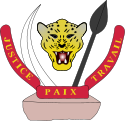- Democratic Republic of the Congo constitutional referendum, 2005
-
Democratic Republic of the Congo 
This article is part of the series:
Politics and government of
the Democratic Republic of the Congo- Constitution
- President (List)
- Government
- Prime Minister (List)
- Parliament
- Political parties
- Elections
- Constitutional Court
- Court of Cassation
- Subdivisions
- MONUC
- Foreign relations
A referendum on a proposed new constitution for the Democratic Republic of Congo was held on December 18 and December 19, 2005. It was approved, paving the way for the country's elections to be held in 2006.
Summary of the 18-19 December 2005 Democratic Republic of the Congo constitutional referendum results Result Votes Percent Yes votes 12,461,001 84.31 No votes 2,319,074 15.69 Total (turnout: 62.0%) 14,780,075 100.00 Invalid votes 725,735 Total votes 15,505,810 Registered voters 25,021,703 Source: African Elections Database The referendum constitution has been a success with more than 80% of approval leading to the election in 2006, after more than 15 years of different transition periods and suffering civil war during those periods, it is now clear that the first multi-party democratic election in DR Congo will take place this year; the independent electoral commission (IEC) has released the list of candidates to run for presidency.
At the beginning they were more than 60 presidential candidates but IEC has rejected some of them and only retained 33 candidates. Among those candidates, there are Mr. Joseph Kabila who is the actual president of the transition government and also three of the deputy presidents of the transitional government. There are also a lot personalities of the former regime of Mobutu as well as many candidates from the opposition, Mr. Etienne Tshisekedi who is one of the leader of the opposition has decided not to run for presidency because his request has not been accepted, indeed he wanted that the IEC to reopen its registration office to register some of his supporters who did not register at the time of registration but the IEC indicated that there is no time for registration of his supporters so he decided to boycott the upcoming election. Survey predicts the victory of the actual president since his potential opponent decided to boycott the election.
The electoral commission mandated elections for president and the legislature on 30 June 2006 to end the transitional government in the DR Congo. Many Congolese were looking forward to voting as it was be their first time. However, there is fear concerning the security situation because of uncontrolled military groups in the country which might launch an attack if the election results prove to be unfavorable. The national army is not totally reunified; two deputy presidents still have control of some of the soldiers of their rebellion movements. The United Nations provided the majority of the security for the Referendum. For the general elections, the United Nations, and the Congolese requested the military aid of the European Union. During the second round of the elections, the Changeless military (FARDC) were ordered into their barracks for the duration. The EU mission left after the new government took power.
 Elections and referendums in the Democratic Republic of the Congo
Elections and referendums in the Democratic Republic of the CongoPresidential elections Parliamentary elections Senatorial elections Gubernatorial elections Referendums Categories:- Referendums in the Democratic Republic of the Congo
- 2005 in the Democratic Republic of the Congo
- 2005 referendums
- 2005 elections in Africa
Wikimedia Foundation. 2010.
